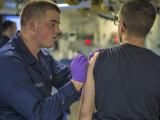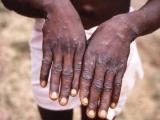Jun 28, 2002 (CIDRAP News) A clinical trial of the decades-old supply of smallpox vaccine held by Aventis Pasteur is in progress, and early signs are that the vaccine is still potent, according to a spokesman for the National Institute of Allergy and Infectious Diseases (NIAID).
Thirty people recently were injected with the Aventis vaccine in the first stage of a trial at Baylor College of Medicine in Houston, Stephen Heyse, MD, MPH, told CIDRAP News. When asked about the "take" rate in those vaccinated so far, he said, "It looks good," but declined to give specifics. Heyes is a medical officer in the NIAID's Office of Clinical Research Affairs, Division of Microbiology and Infectious Disease, in Bethesda, Md.
The existence of the Aventis supply of 75 million to 90 million doses of vaccinia vaccine was revealed last March. The company said it would give the supply to the federal government to build up the national stockpile. Tommy Thompson, secretary of the Department of Health and Human Services (HHS), said then that the government would acquire the vaccine if tests showed it to be safe and effective. The vaccine has been in storage at an undisclosed site since routine smallpox vaccination ended in 1972. Aventis Pasteur, the US division of French-based Aventis, is headquartered in Swiftwater, Pa.
HHS currently has a stockpile of about 15.4 million doses of old vaccinia vaccine, called Dryvax, produced from calf lymph. The department has contracted with Acambis Inc. and its partner, Baxter International, to produce another 209 million doses from cell culture. Those doses are due for delivery by the end of this year.
Heyse said the recent vaccinations in Houston were the first stage of a trial that will have 11 arms of 30 people each, for a total of 330. The trial will test the full-strength vaccine and various dilutions in young adults, and will use Dryvax from the existing stockpile as a control. The trial will be carried out at Baylor and three other institutions: Vanderbilt University in Nashville, the University of Iowa in Iowa City, and Northern California Kaiser Permanente, in the San Francisco area. The principal investigator for the trial is Robert Couch, MD, of Baylor College of Medicine, Heyse said.
In the initial work at Baylor, two groups of 15 people each were recently injected with undiluted vaccine from two different lots of the Aventis supply, Heyse said. A third group of 15 was injected with undiluted Dryvax. Recruiting of trial participants at the other centers will begin within 2 or 3 weeks, he said.
Officials at Vanderbilt University recently announced that they were planning to recruit 75 to 100 people for their part of the vaccine trial. The University of Iowa said it is looking for 95 participants.
One lot of the Aventis vaccine is slightly more concentrated than the other, Heyse said. That lot will be tested at full strength and at dilution ratios of 1:3.2, 1:30, and 1:32; the 1:3.2 dilution will make the vaccine about equal in concentration to undiluted Dryvax. The other lot of Aventis vaccine will be tested at full strength and at dilutions of 1:3.2 and 1:10. Dryvax will be used at full strength and dilutions of 1:10, 1:32, and 1:10. (The dilution ratios were chosen to provide equal logarithmic intervals of about a half log each.)
Heyes said the purpose of testing multiple dilutions is to determine how much the vaccine can be diluted and still be effective, though it's unlikely that vaccine for general use would be watered down by more than 1:5. "I don't think we'd actually go beyond 1:5, but doing this additional dilution gives us the extra cushion of knowing where the take rate would fall off. It's important to have a cushion."
An earlier trial of Dryvax in 680 young adults showed that it remains effective at dilutions of 1:5 and 1:10. Those results, published in March, showed no significant differences in take rates between the full-strength vaccine and the two dilutions. Diluting the existing stockpile by 1:5 would increase it to about 77 million doses.
The current trial of the Aventis vaccine is in the nature of a pilot study, and plans call for starting a larger trial late in the fall, Heyse said.
Meanwhile, additional trials of Dryvax are in progress. In one, Heyes said, adults who had been vaccinated against smallpox in childhood were recently vaccinated again. That trial should shed some light on the contentious question of how long the vaccine remains effective, he said. In addition, a small pilot study of the use of Dryvax in children is about to begin, he said. A group of children aged 2 to 5 years will be inoculated with a 1:5 dilution of the vaccine.
See also:
Vanderbilt University news release about Vanderbilt's participation in the vaccine trial
http://www.mc.vanderbilt.edu/reporter/index.html?ID=2135
University of Iowa news release about the trial
http://news-releases.uiowa.edu/2002/june/0620smallpox-study.html



















